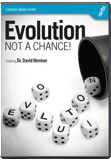Does Math Prove Evolution?
A new mathematical model “has offered even more evidence of the correctness of evolutionary theory.” So how does math “prove” evolution?
News Source
Mathematician Herbert Wilf and biologist Warren Ewens, both of the University of Pennsylvania, have teamed up to research the claim that even hundreds of millions of years isn’t enough time for life to have evolved, genetically speaking. Their model purports to show mathematically that, given plausible mutation rates and a selection mechanism (akin to natural selection), there would be ample time in earth’s history for the genomes of complex life-forms to have evolved.
There would be ample time in earth’s history for the genomes of complex life-forms to have evolved.
The team’s idea is virtually identical to an illustration originally used by Richard Dawkins more than two decades ago to argue for the plausibility of evolution. Thus, the numerous critiques of that illustration apply equally to the new research; for one prominent deconstruction see Dawkins’ weasel revisited.
The primary flaw in both Dawkins’ model and Wilf and Ewens’ is that the mutation and selection process occur in what is essentially a biological “vacuum”: a full-length genome simply exists, and the process of replication and mutation occur by some exogenous biological process. Thus, even if the genome contains no meaningful information, the model allows the genome to reproduce without difficulty—and to do so again and again, with “correct” mutations magically preserved throughout the process. In reality, a creature can only survive to reproduce if its genome controls a host of complex biological functions; in the meantime, mutated genes can wreak biological havoc even if other genes are intact.
Thus, ignoring whether the math in the paper is accurate (though we assume it is), the model is an incorrect abstraction from reality; the model is basically rigged because of its flaw. Moreover, scientists and mathematicians on both sides of the debate have put forward a range of models, each claiming to show how evolution is possible (or impossible); unfortunately, the models often seem to “talk past” one another, illustrating points of contention in the origins debate rather than actually “proving” anything.
Besides, we often make the point that even if evolution had no theoretical difficulties—even if it were entirely “plausible”—that does not indicate that it actually occurred and the Bible clearly states in Genesis that God created everything by His Word in 6 days. Simply put, “could have” does not mean “did”!
For More Information: Get Answers
Remember, if you see a news story that might merit some attention, let us know about it! (Note: if the story originates from the Associated Press, FOX News, MSNBC, the New York Times, or another major national media outlet, we will most likely have already heard about it.) And thanks to all of our readers who have submitted great news tips to us. If you didn’t catch all the latest News to Know, why not take a look to see what you’ve missed?
(Please note that links will take you directly to the source. Answers in Genesis is not responsible for content on the websites to which we refer. For more information, please see our Privacy Policy.)
Recommended Resources

Answers in Genesis is an apologetics ministry, dedicated to helping Christians defend their faith and proclaim the good news of Jesus Christ.
- Customer Service 800.778.3390
- © 2024 Answers in Genesis








